Question: Hi, I need a help about this lab. This is C++. I have to execute this on Matrix, so hopefully answer will work with it.
Hi, I need a help about this lab. This is C++.
I have to execute this on Matrix, so hopefully answer will work with it.
Thank you in advance.
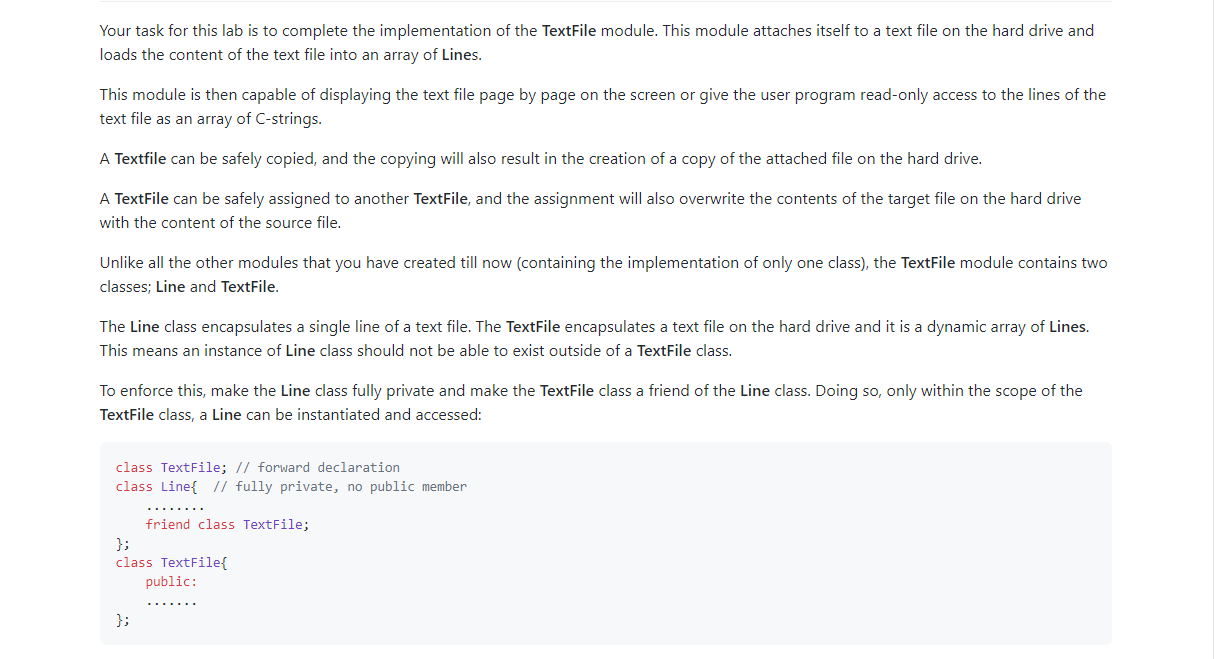
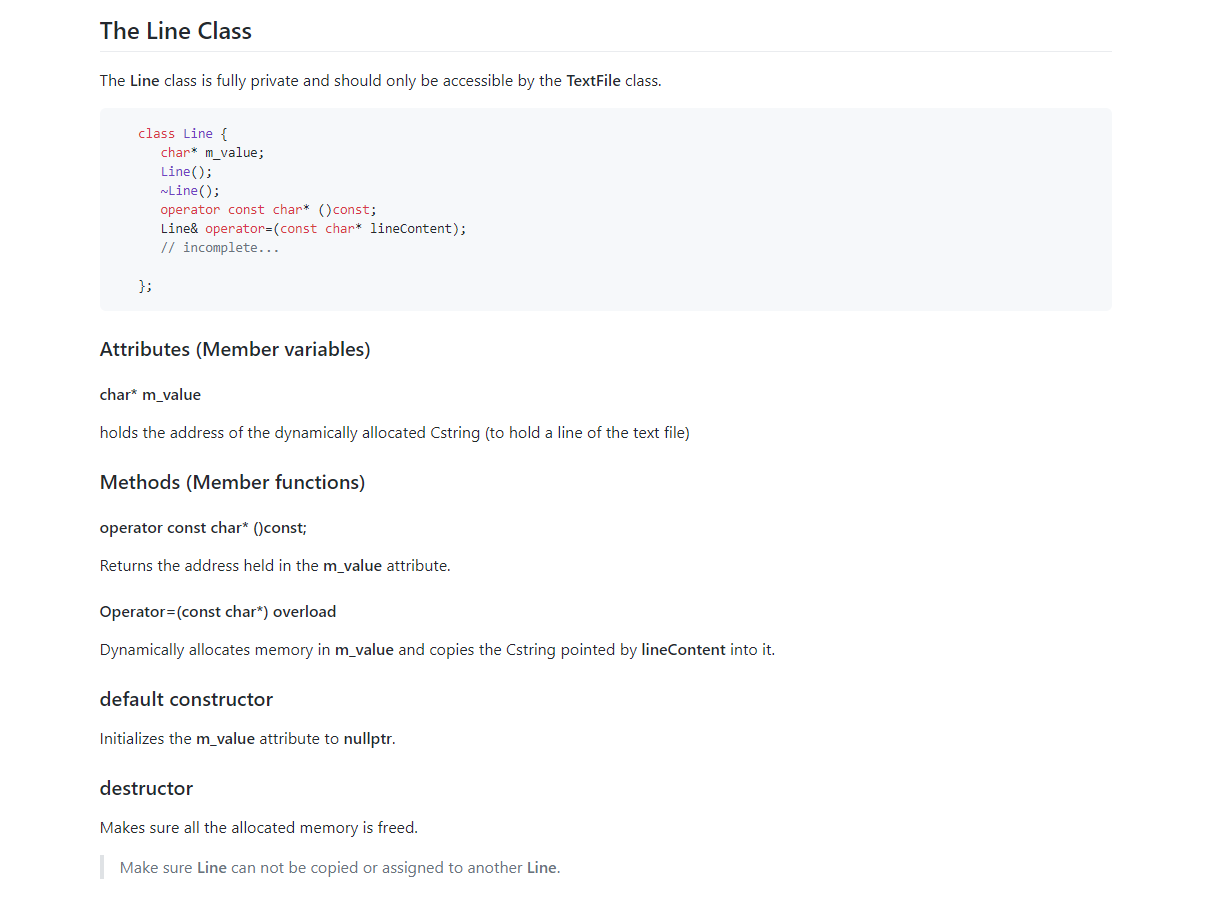
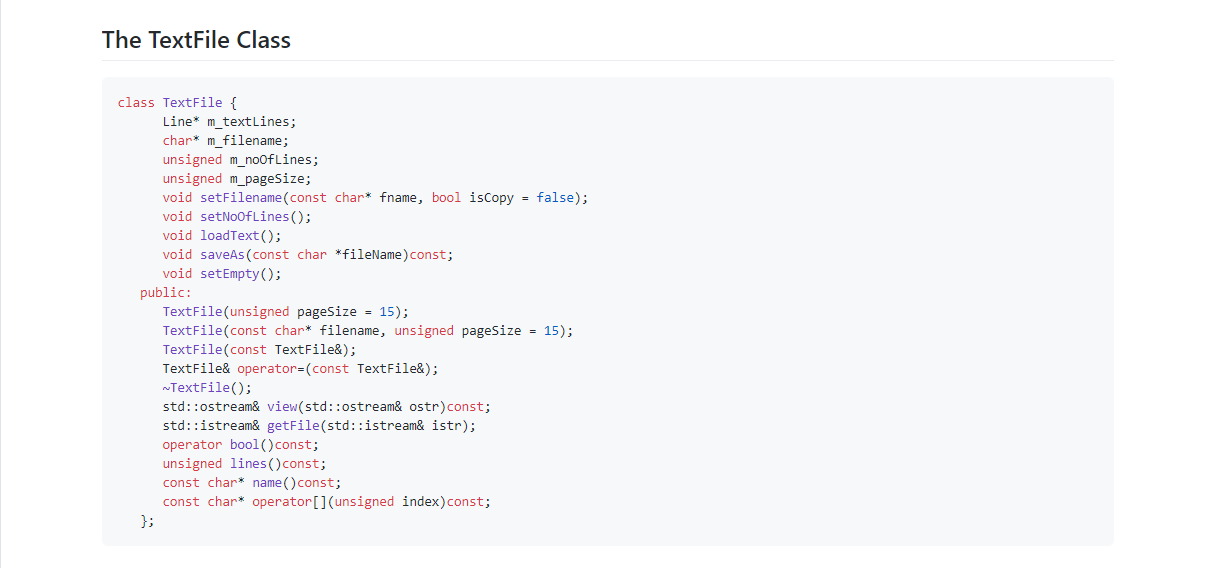
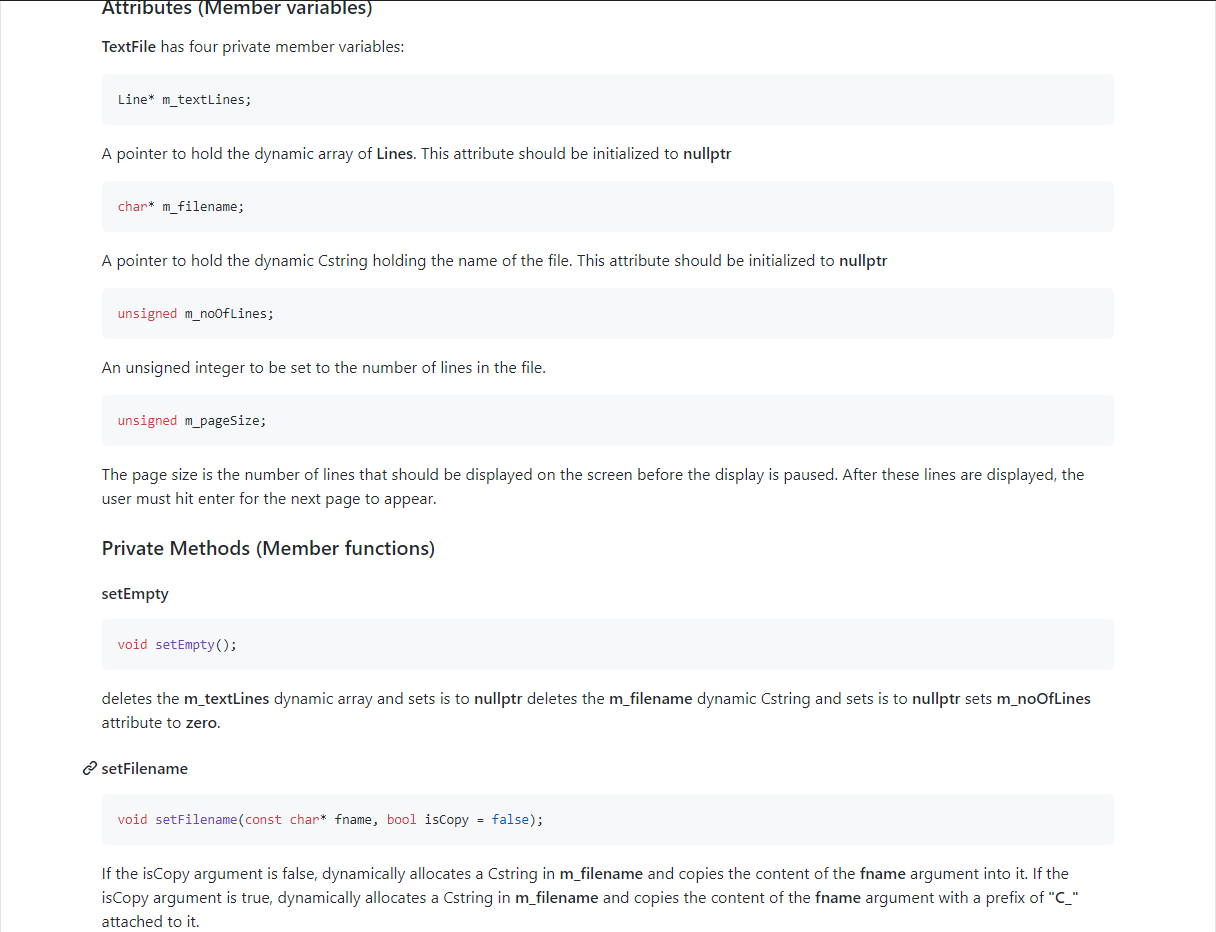
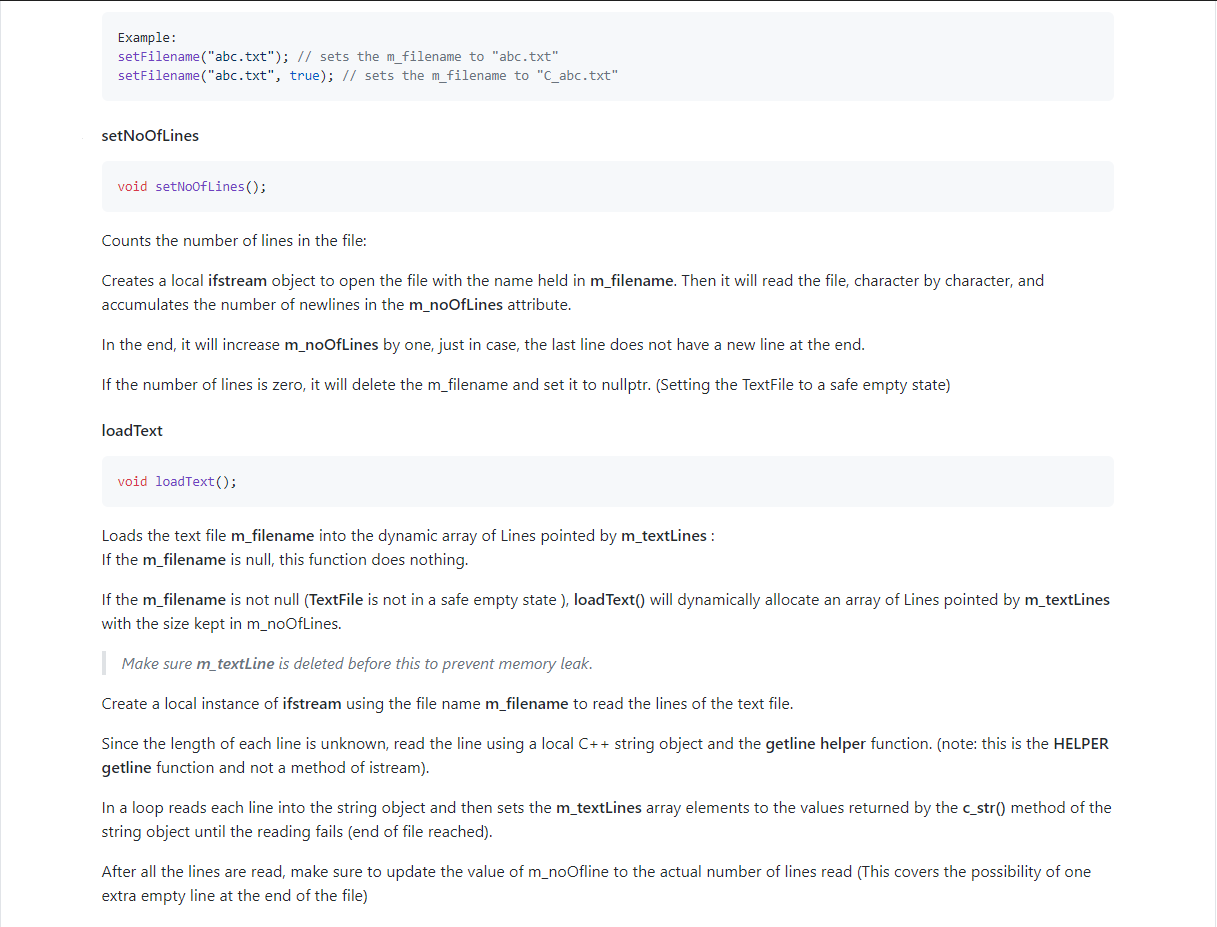
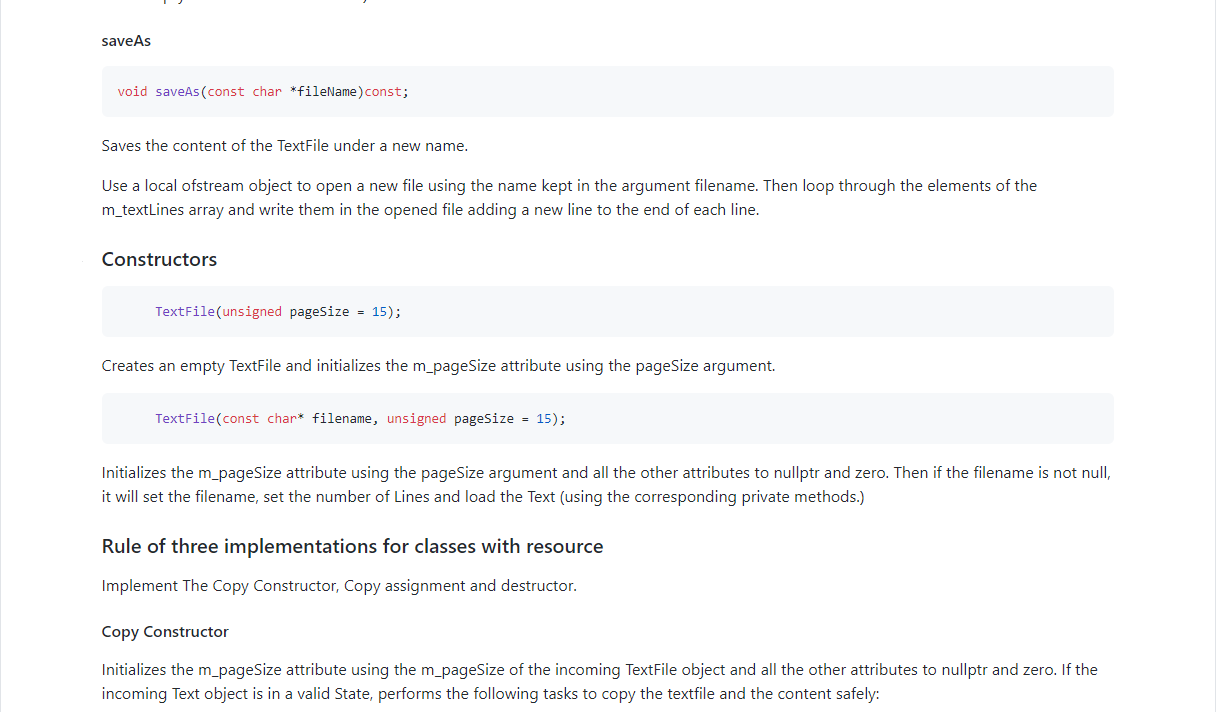
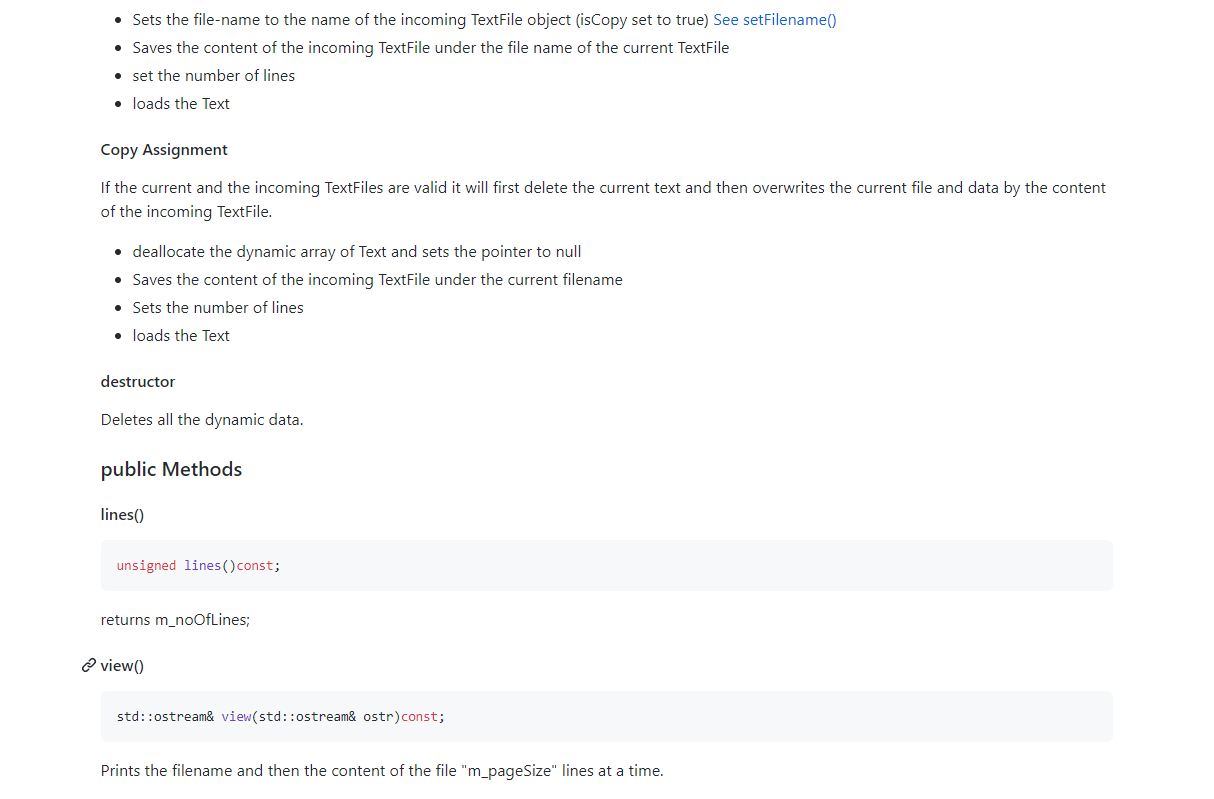
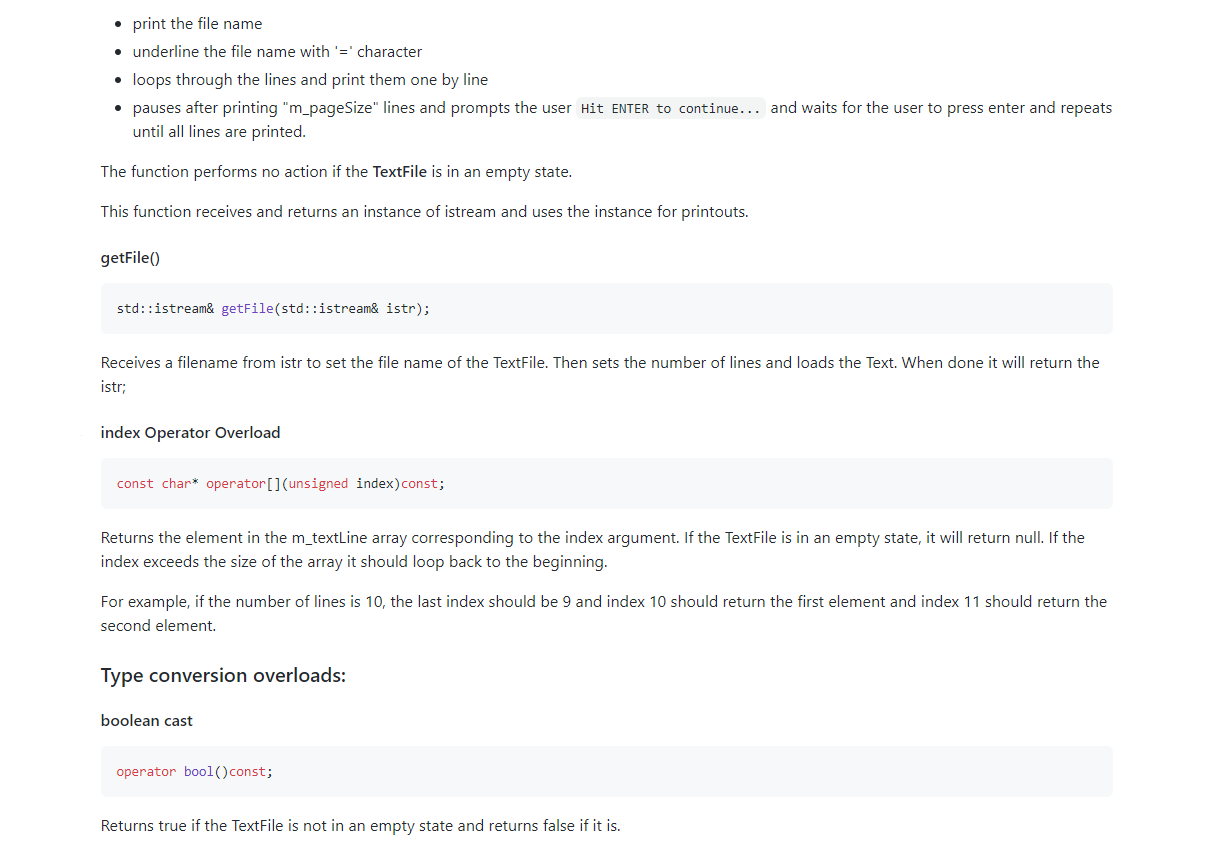
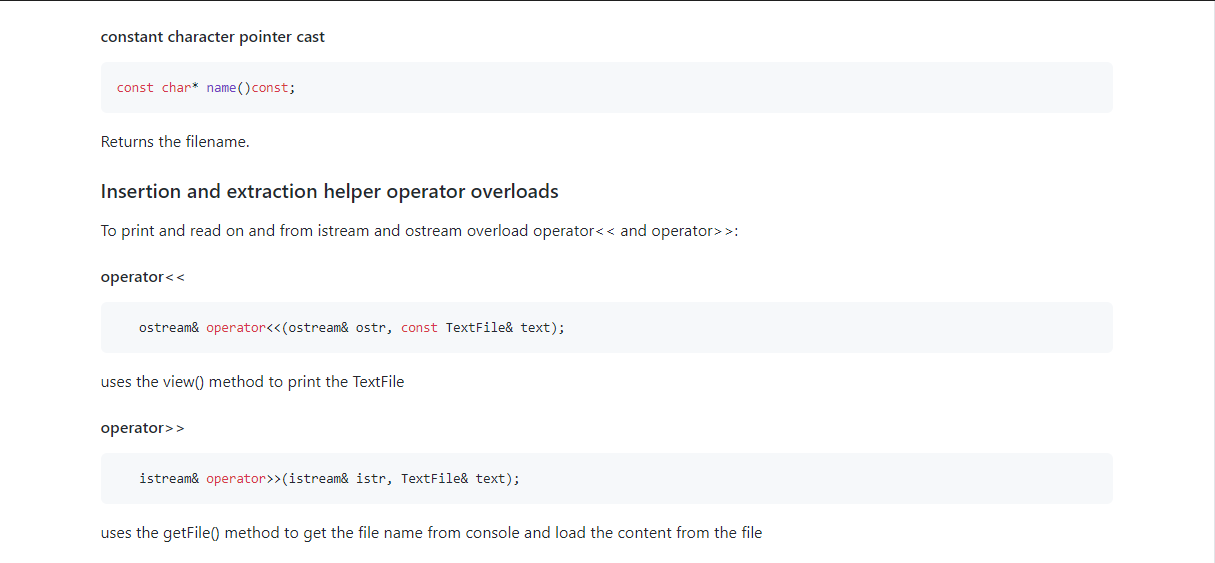
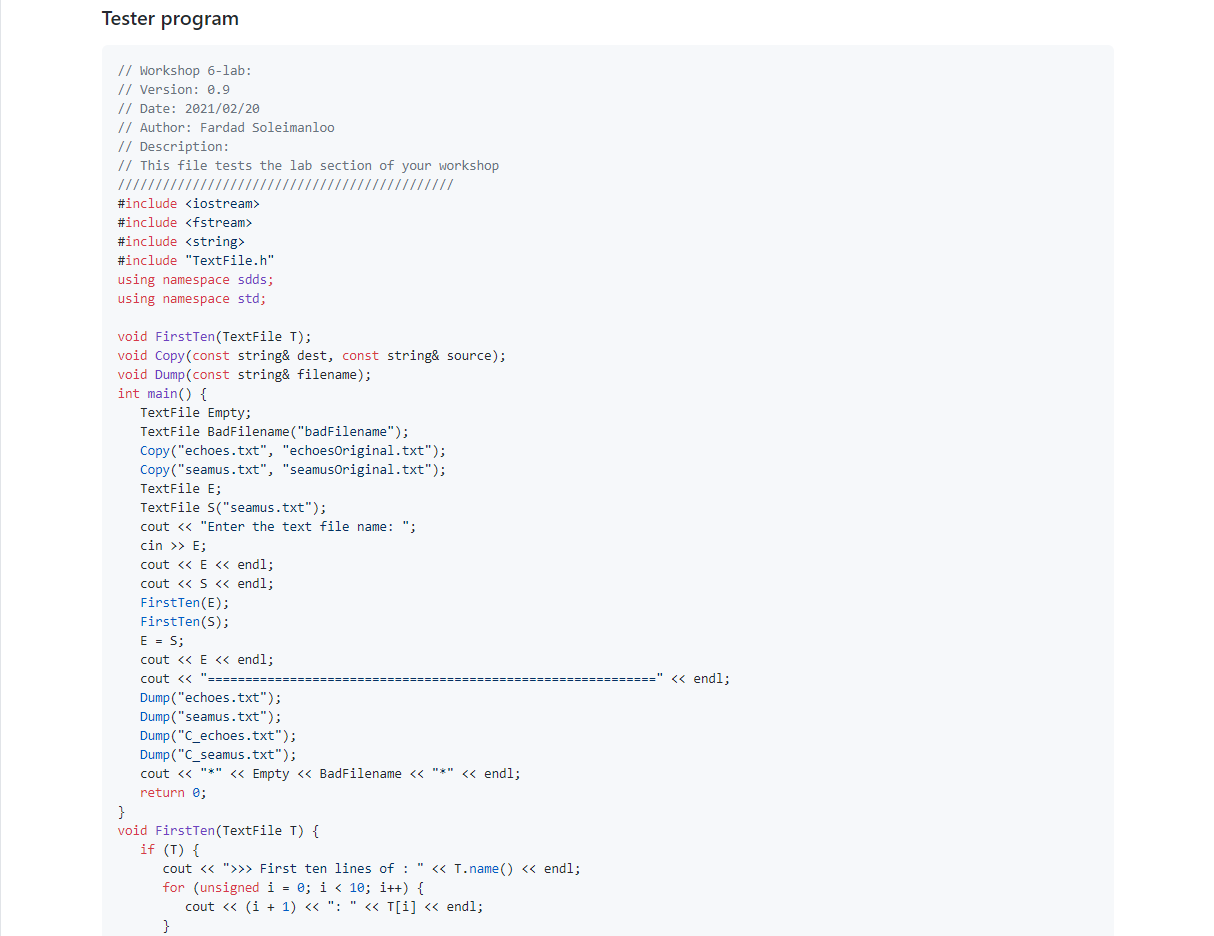

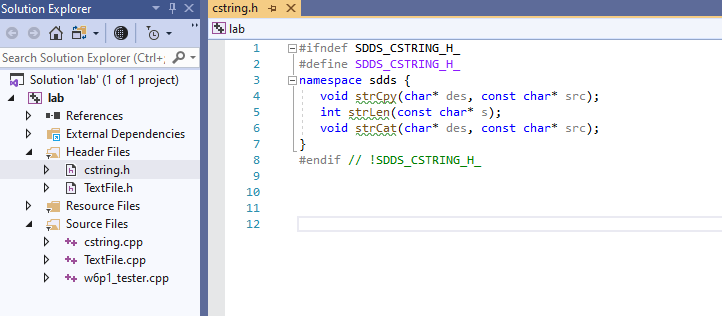
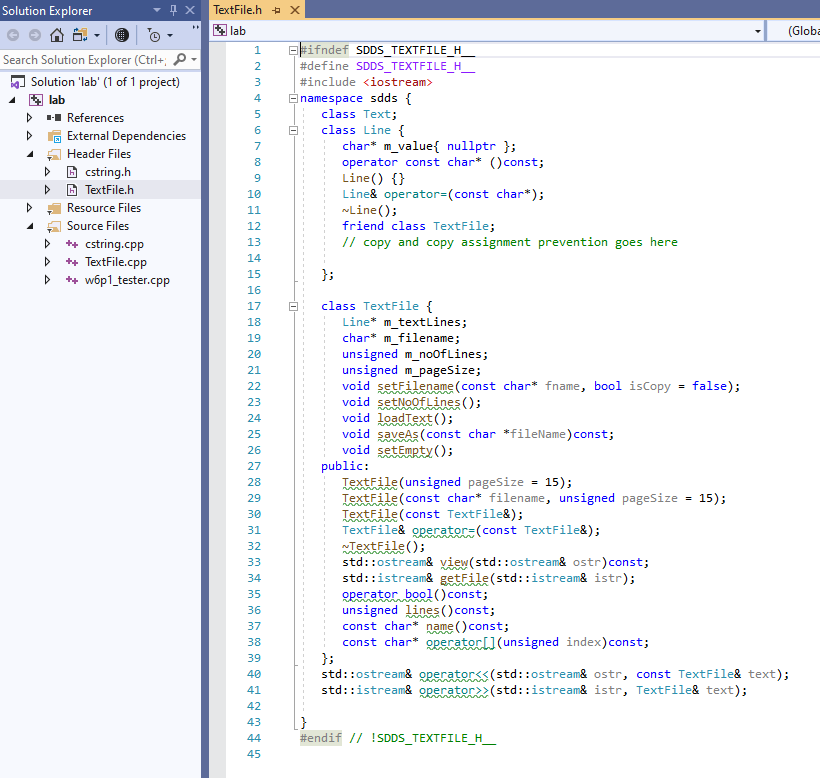
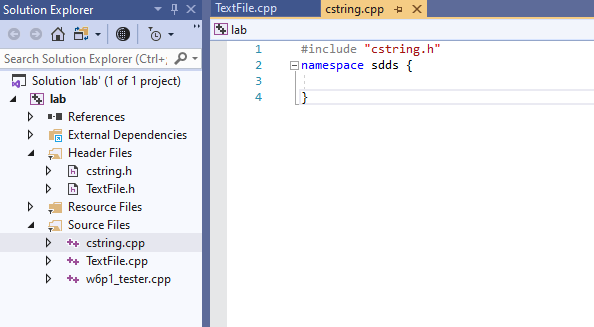
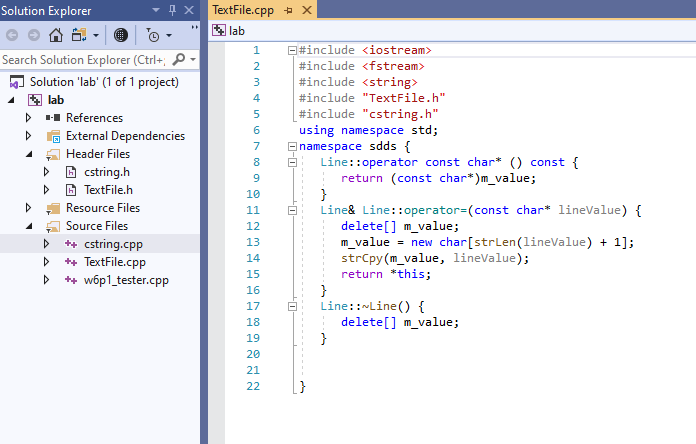
Your task for this lab is to complete the implementation of the TextFile module. This module attaches itself to a text file on the hard drive and loads the content of the text file into an array of Lines. This module is then capable of displaying the text file page by page on the screen or give the user program read-only access to the lines of the text file as an array of C-strings. A Textfile can be safely copied, and the copying will also result in the creation of a copy of the attached file on the hard drive. A TextFile can be safely assigned to another TextFile, and the assignment will also overwrite the contents of the target file on the hard drive with the content of the source file. Unlike all the other modules that you have created till now (containing the implementation of only one class), the TextFile module contains two classes; Line and TextFile. The Line class encapsulates a single line of a text file. The TextFile encapsulates a text file on the hard drive and it is a dynamic array of Lines. This means an instance of Line class should not be able to exist outside of a TextFile class. To enforce this, make the Line class fully private and make the TextFile class a friend of the Line class. Doing so, only within the scope of the TextFile class, a Line can be instantiated and accessed: class TextFile; // forward declaration class Line{ // fully private, no public member friend class TextFile; }; class TextFile public: }; The Line Class The Line class is fully private and should only be accessible by the TextFile class. class Line { char* m_value; Line(); wLine(); operator const char* () const; Line& operator=(const char* lineContent); // incomplete... }; Attributes (Member variables) char* m_value holds the address of the dynamically allocated Cstring (to hold a line of the text file) Methods (Member functions) operator const char* (const; Returns the address held in the m_value attribute. Operator=(const char*) overload Dynamically allocates memory in m_value and copies the Cstring pointed by lineContent into it. default constructor Initializes the m_value attribute to nullptr. destructor Makes sure all the allocated memory is freed. Make sure Line can not be copied or assigned to another Line. The TextFile Class class TextFile { Line* m_textLines; char* m_filename; unsigned m_noofLines; unsigned m_pageSize; void setFilename(const char* fname, bool isCopy = false); void setNoOfLines(); void loadText(); void saveAs (const char *fileName) const; void setEmpty(); public: TextFile(unsigned pageSize = 15); TextFile(const char* filename, unsigned pageSize = 15); TextFile(const TextFile&); TextFile& operator=(const TextFile&); TextFile(); std::ostream& view(std::ostream& ostr)const; std::istream& getFile(std::istream& istr); operator bool()const; unsigned lines() const; const char* name() const; const char* operator[](unsigned index) const; }; Attributes (Member variables) TextFile has four private member variables: Line* m_textLines; A pointer to hold the dynamic array of Lines. This attribute should be initialized to nullptr char* m_filename; A pointer to hold the dynamic Cstring holding the name of the file. This attribute should be initialized to nullptr unsigned m_noofLines; An unsigned integer to be set to the number of lines in the file. unsigned m_pageSize; The page size is the number of lines that should be displayed on the screen before the display is paused. After these lines are displayed, the user must hit enter for the next page to appear. Private Methods (Member functions) setEmpty void setEmpty(); deletes the m_textLines dynamic array and sets is to nullptr deletes the m_filename dynamic Cstring and sets is to nullptr sets m_noOfLines attribute to zero. setFilename void setFilename(const char* fname, bool isCopy = false); If the isCopy argument is false, dynamically allocates a Cstring in m_filename and copies the content of the frame argument into it. If the isCopy argument is true, dynamically allocates a Cstring in m_filename and copies the content of the fname argument with a prefix of "C_" attached to it. Example: setFilename("abc.txt"); // sets the m_filename to "abc.txt" setFilename ("abc.txt", true); // sets the m_filename to "C_abc.txt" setNoOfLines void setNoOfLines(); Counts the number of lines in the file: Creates a local ifstream object to open the file with the name held in m_filename. Then it will read the file, character by character, and accumulates the number of newlines in the m_noOfLines attribute. In the end, it will increase m_noOfLines by one, just in case, the last line does not have a new line at the end. If the number of lines is zero, it will delete the m_filename and set it to nullptr. (Setting the TextFile to a safe empty state) load Text void loadText(); Loads the text file m_filename into the dynamic array of Lines pointed by m_textLines: If the m_filename is null, this function does nothing. If the m_filename is not null (TextFile is not in a safe empty state ), load Text() will dynamically allocate an array of Lines pointed by m_textLines with the size kept in m_noOfLines. | Make sure m_textLine is deleted before this to prevent memory leak. Create a local instance of ifstream using the file name m_filename to read the lines of the text file. Since the length of each line is unknown, read the line using a local C++ string object and the getline helper function. (note: this is the HELPER getline function and not a method of istream). In a loop reads each line into the string object and then sets the m_textLines array elements to the values returned by the c_str() method of the string object until the reading fails (end of file reached). After all the lines are read, make sure to update the value of m_noOfline to the actual number of lines read (This covers the possibility of one extra empty line at the end of the file) saveAs void saveAs(const char *fileName) const; Saves the content of the TextFile under a new name. Use a local ofstream object to open a new file using the name kept in the argument filename. Then loop through the elements of the m_textLines array and write them in the opened file adding a new line to the end of each line. Constructors TextFile(unsigned pageSize = 15); Creates an empty TextFile and initializes the m_pageSize attribute using the pageSize argument. TextFile(const char* filename, unsigned pageSize = 15); Initializes the m_pageSize attribute using the pageSize argument and all the other attributes to nullptr and zero. Then if the filename is not null, it will set the filename, set the number of Lines and load the Text (using the corresponding private methods.) Rule of three implementations for classes with resource Implement The Copy Constructor, Copy assignment and destructor. Copy Constructor Initializes the m_pageSize attribute using the m_pageSize of the incoming TextFile object and all the other attributes to nullptr and zero. If the incoming Text object is in a valid State, performs the following tasks to copy the textfile and the content safely: Sets the file-name to the name of the incoming TextFile object is Copy set to true) See setFilename) Saves the content of the incoming TextFile under the file name of the current TextFile set the number of lines loads the Text Copy Assignment If the current and the incoming TextFiles are valid it will first delete the current text and then overwrites the current file and data by the content of the incoming TextFile. deallocate the dynamic array of Text and sets the pointer to null Saves the content of the incoming Text File under the current filename Sets the number of lines loads the Text destructor Deletes all the dynamic data. public Methods lines() unsigned lines() const; returns m_noOfLines; view) std::ostream& view(std::ostream& ostr) const; Prints the filename and then the content of the file "m_pageSize" lines at a time. print the file name underline the file name with '=' character loops through the lines and print them one by line pauses after printing "m_pageSize" lines and prompts the user Hit ENTER to continue... and waits for the user to press enter and repeats until all lines are printed. The function performs no action if the TextFile is in an empty state. This function receives and returns an instance of istream and uses the instance for printouts. getFile() std::istream& getFile(std::istream& istr); Receives a filename from istr to set the file name of the TextFile. Then sets the number of lines and loads the Text. When done it will return the istr; index Operator Overload const char* operator[](unsigned index) const; Returns the element in the m_textLine array corresponding to the index argument. If the TextFile is in an empty state, it will return null. If the index exceeds the size of the array it should loop back to the beginning. For example, if the number of lines is 10, the last index should be 9 and index 10 should return the first element and index 11 should return the second element. Type conversion overloads: boolean cast operator bool() const; Returns true if the TextFile is not in an empty state and returns false if it is. constant character pointer cast const char* name() const; Returns the filename. Insertion and extraction helper operator overloads To print and read on and from istream and ostream overload operator> operator> istream& operator>>(istream& istr, TextFile& text); uses the getFile() method to get the file name from console and load the content from the file Tester program // Workshop 6-lab: // Version: 0.9 // Date: 2021/02/20 // Author: Fardad Soleimanloo // Description: // This file tests the lab section of your workshop #include #include #include #include "TextFile.h" using namespace sdds; using namespace std; void FirstTen(TextFile T); void Copy(const string& dest, const string& source); void Dump (const string& filename); int main() { TextFile Empty; TextFile BadFilename("badFilename"); Copy("echoes.txt", "echoesOriginal.txt"); Copy("seamus.txt", "seamusOriginal.txt"); TextFile E; TextFile S("seamus.txt"); cout > E; cout >> First ten lines of : " >>" 1 lab 4 namespace sdds { -1 References 5 class Text; 6 External Dependencies class Line { 7 Header Files char* m_value{ nullptr }; 8 operator const char* () const; cstring.h 9 Line() {} TextFile.h 10 Line& operator=(const char*); Resource Files 11 wLine(); Source Files 12 friend class TextFile; ++ cstring.cpp 13 1/ copy and copy assignment prevention goes here ++ TextFile.cpp 14 15 ++ w6p1_tester.cpp }; 16 17 class TextFile { 18 Line* m_textLines; 19 char* m_filename; 20 unsigned m_noofLines; 21 unsigned m_pageSize; 22 void setFilename(const char* fname, bool isCopy = false); 23 void setNoofLine(); 24 void loadText(); 25 void saveAs (const char *fileName) const; 26 void setEmpty(); 27 public: 28 TextFile(unsigned pageSize 15); 29 TextFile(const char* filename, unsigned pageSize = 15); 30 TextFile(const TextFile&); 31 TextFile& operator=(const TextFile&); 32 TextFile(); 33 std::ostream& view(std::ostream& ostr)const; std::istream& getFile(std::istream& istr); operator bool() const; unsigned lines) const; const char* name() const; const char* operator] (unsigned index)const; 39 }; std::ostream& operator>(std::istream& istr, TextFile& text); 42 } #endif // SDDS_TEXTFILE_H__ 45 34 35 36 37 38 40 cstring.cpp + x #include "estring.h" namespace sdds { 4 Solution Explorer TextFile.cpp lab 1 Search Solution Explorer (Ctrl+: 2 Solution 'lab' (1 of 1 project) 3 lab -- References External Dependencies Header Files cstring.h TextFile.h Resource Files Source Files ++ cstring.cpp ++ TextFile.cpp ++ w6p1_tester.cpp 2 Solution Explorer I x TextFile.cpp + x lab 1 #include Search Solution Explorer (Ctrl+ P #include Solution 'lab' (1 of 1 project) 3 #include 1 lab 4 #include "TextFile.h" - References 5 #include "estring.h" 6 External Dependencies using namespace std; 7 Header Files namespace sdds { 8 Line::operator const char* () const { cstring.h 9 return (const char*)m_value; TextFile.h 10 } Resource Files 11 Line& Line::operator=(const char* lineValue) { Source Files 12 delete[] m_value; ++ cstring.cpp m_value = new char[strlen(lineValue) + 1]; ++ TextFile.cpp strcpy(m_value, lineValue); ++ w6p1_tester.cpp return *this; } 17 Line::-Line() { delete[] m_value; 19 } - 13 14 15 16 18 20 21 22 Your task for this lab is to complete the implementation of the TextFile module. This module attaches itself to a text file on the hard drive and loads the content of the text file into an array of Lines. This module is then capable of displaying the text file page by page on the screen or give the user program read-only access to the lines of the text file as an array of C-strings. A Textfile can be safely copied, and the copying will also result in the creation of a copy of the attached file on the hard drive. A TextFile can be safely assigned to another TextFile, and the assignment will also overwrite the contents of the target file on the hard drive with the content of the source file. Unlike all the other modules that you have created till now (containing the implementation of only one class), the TextFile module contains two classes; Line and TextFile. The Line class encapsulates a single line of a text file. The TextFile encapsulates a text file on the hard drive and it is a dynamic array of Lines. This means an instance of Line class should not be able to exist outside of a TextFile class. To enforce this, make the Line class fully private and make the TextFile class a friend of the Line class. Doing so, only within the scope of the TextFile class, a Line can be instantiated and accessed: class TextFile; // forward declaration class Line{ // fully private, no public member friend class TextFile; }; class TextFile public: }; The Line Class The Line class is fully private and should only be accessible by the TextFile class. class Line { char* m_value; Line(); wLine(); operator const char* () const; Line& operator=(const char* lineContent); // incomplete... }; Attributes (Member variables) char* m_value holds the address of the dynamically allocated Cstring (to hold a line of the text file) Methods (Member functions) operator const char* (const; Returns the address held in the m_value attribute. Operator=(const char*) overload Dynamically allocates memory in m_value and copies the Cstring pointed by lineContent into it. default constructor Initializes the m_value attribute to nullptr. destructor Makes sure all the allocated memory is freed. Make sure Line can not be copied or assigned to another Line. The TextFile Class class TextFile { Line* m_textLines; char* m_filename; unsigned m_noofLines; unsigned m_pageSize; void setFilename(const char* fname, bool isCopy = false); void setNoOfLines(); void loadText(); void saveAs (const char *fileName) const; void setEmpty(); public: TextFile(unsigned pageSize = 15); TextFile(const char* filename, unsigned pageSize = 15); TextFile(const TextFile&); TextFile& operator=(const TextFile&); TextFile(); std::ostream& view(std::ostream& ostr)const; std::istream& getFile(std::istream& istr); operator bool()const; unsigned lines() const; const char* name() const; const char* operator[](unsigned index) const; }; Attributes (Member variables) TextFile has four private member variables: Line* m_textLines; A pointer to hold the dynamic array of Lines. This attribute should be initialized to nullptr char* m_filename; A pointer to hold the dynamic Cstring holding the name of the file. This attribute should be initialized to nullptr unsigned m_noofLines; An unsigned integer to be set to the number of lines in the file. unsigned m_pageSize; The page size is the number of lines that should be displayed on the screen before the display is paused. After these lines are displayed, the user must hit enter for the next page to appear. Private Methods (Member functions) setEmpty void setEmpty(); deletes the m_textLines dynamic array and sets is to nullptr deletes the m_filename dynamic Cstring and sets is to nullptr sets m_noOfLines attribute to zero. setFilename void setFilename(const char* fname, bool isCopy = false); If the isCopy argument is false, dynamically allocates a Cstring in m_filename and copies the content of the frame argument into it. If the isCopy argument is true, dynamically allocates a Cstring in m_filename and copies the content of the fname argument with a prefix of "C_" attached to it. Example: setFilename("abc.txt"); // sets the m_filename to "abc.txt" setFilename ("abc.txt", true); // sets the m_filename to "C_abc.txt" setNoOfLines void setNoOfLines(); Counts the number of lines in the file: Creates a local ifstream object to open the file with the name held in m_filename. Then it will read the file, character by character, and accumulates the number of newlines in the m_noOfLines attribute. In the end, it will increase m_noOfLines by one, just in case, the last line does not have a new line at the end. If the number of lines is zero, it will delete the m_filename and set it to nullptr. (Setting the TextFile to a safe empty state) load Text void loadText(); Loads the text file m_filename into the dynamic array of Lines pointed by m_textLines: If the m_filename is null, this function does nothing. If the m_filename is not null (TextFile is not in a safe empty state ), load Text() will dynamically allocate an array of Lines pointed by m_textLines with the size kept in m_noOfLines. | Make sure m_textLine is deleted before this to prevent memory leak. Create a local instance of ifstream using the file name m_filename to read the lines of the text file. Since the length of each line is unknown, read the line using a local C++ string object and the getline helper function. (note: this is the HELPER getline function and not a method of istream). In a loop reads each line into the string object and then sets the m_textLines array elements to the values returned by the c_str() method of the string object until the reading fails (end of file reached). After all the lines are read, make sure to update the value of m_noOfline to the actual number of lines read (This covers the possibility of one extra empty line at the end of the file) saveAs void saveAs(const char *fileName) const; Saves the content of the TextFile under a new name. Use a local ofstream object to open a new file using the name kept in the argument filename. Then loop through the elements of the m_textLines array and write them in the opened file adding a new line to the end of each line. Constructors TextFile(unsigned pageSize = 15); Creates an empty TextFile and initializes the m_pageSize attribute using the pageSize argument. TextFile(const char* filename, unsigned pageSize = 15); Initializes the m_pageSize attribute using the pageSize argument and all the other attributes to nullptr and zero. Then if the filename is not null, it will set the filename, set the number of Lines and load the Text (using the corresponding private methods.) Rule of three implementations for classes with resource Implement The Copy Constructor, Copy assignment and destructor. Copy Constructor Initializes the m_pageSize attribute using the m_pageSize of the incoming TextFile object and all the other attributes to nullptr and zero. If the incoming Text object is in a valid State, performs the following tasks to copy the textfile and the content safely: Sets the file-name to the name of the incoming TextFile object is Copy set to true) See setFilename) Saves the content of the incoming TextFile under the file name of the current TextFile set the number of lines loads the Text Copy Assignment If the current and the incoming TextFiles are valid it will first delete the current text and then overwrites the current file and data by the content of the incoming TextFile. deallocate the dynamic array of Text and sets the pointer to null Saves the content of the incoming Text File under the current filename Sets the number of lines loads the Text destructor Deletes all the dynamic data. public Methods lines() unsigned lines() const; returns m_noOfLines; view) std::ostream& view(std::ostream& ostr) const; Prints the filename and then the content of the file "m_pageSize" lines at a time. print the file name underline the file name with '=' character loops through the lines and print them one by line pauses after printing "m_pageSize" lines and prompts the user Hit ENTER to continue... and waits for the user to press enter and repeats until all lines are printed. The function performs no action if the TextFile is in an empty state. This function receives and returns an instance of istream and uses the instance for printouts. getFile() std::istream& getFile(std::istream& istr); Receives a filename from istr to set the file name of the TextFile. Then sets the number of lines and loads the Text. When done it will return the istr; index Operator Overload const char* operator[](unsigned index) const; Returns the element in the m_textLine array corresponding to the index argument. If the TextFile is in an empty state, it will return null. If the index exceeds the size of the array it should loop back to the beginning. For example, if the number of lines is 10, the last index should be 9 and index 10 should return the first element and index 11 should return the second element. Type conversion overloads: boolean cast operator bool() const; Returns true if the TextFile is not in an empty state and returns false if it is. constant character pointer cast const char* name() const; Returns the filename. Insertion and extraction helper operator overloads To print and read on and from istream and ostream overload operator> operator> istream& operator>>(istream& istr, TextFile& text); uses the getFile() method to get the file name from console and load the content from the file Tester program // Workshop 6-lab: // Version: 0.9 // Date: 2021/02/20 // Author: Fardad Soleimanloo // Description: // This file tests the lab section of your workshop #include #include #include #include "TextFile.h" using namespace sdds; using namespace std; void FirstTen(TextFile T); void Copy(const string& dest, const string& source); void Dump (const string& filename); int main() { TextFile Empty; TextFile BadFilename("badFilename"); Copy("echoes.txt", "echoesOriginal.txt"); Copy("seamus.txt", "seamusOriginal.txt"); TextFile E; TextFile S("seamus.txt"); cout > E; cout >> First ten lines of : " >>" 1 lab 4 namespace sdds { -1 References 5 class Text; 6 External Dependencies class Line { 7 Header Files char* m_value{ nullptr }; 8 operator const char* () const; cstring.h 9 Line() {} TextFile.h 10 Line& operator=(const char*); Resource Files 11 wLine(); Source Files 12 friend class TextFile; ++ cstring.cpp 13 1/ copy and copy assignment prevention goes here ++ TextFile.cpp 14 15 ++ w6p1_tester.cpp }; 16 17 class TextFile { 18 Line* m_textLines; 19 char* m_filename; 20 unsigned m_noofLines; 21 unsigned m_pageSize; 22 void setFilename(const char* fname, bool isCopy = false); 23 void setNoofLine(); 24 void loadText(); 25 void saveAs (const char *fileName) const; 26 void setEmpty(); 27 public: 28 TextFile(unsigned pageSize 15); 29 TextFile(const char* filename, unsigned pageSize = 15); 30 TextFile(const TextFile&); 31 TextFile& operator=(const TextFile&); 32 TextFile(); 33 std::ostream& view(std::ostream& ostr)const; std::istream& getFile(std::istream& istr); operator bool() const; unsigned lines) const; const char* name() const; const char* operator] (unsigned index)const; 39 }; std::ostream& operator>(std::istream& istr, TextFile& text); 42 } #endif // SDDS_TEXTFILE_H__ 45 34 35 36 37 38 40 cstring.cpp + x #include "estring.h" namespace sdds { 4 Solution Explorer TextFile.cpp lab 1 Search Solution Explorer (Ctrl+: 2 Solution 'lab' (1 of 1 project) 3 lab -- References External Dependencies Header Files cstring.h TextFile.h Resource Files Source Files ++ cstring.cpp ++ TextFile.cpp ++ w6p1_tester.cpp 2 Solution Explorer I x TextFile.cpp + x lab 1 #include Search Solution Explorer (Ctrl+ P #include Solution 'lab' (1 of 1 project) 3 #include 1 lab 4 #include "TextFile.h" - References 5 #include "estring.h" 6 External Dependencies using namespace std; 7 Header Files namespace sdds { 8 Line::operator const char* () const { cstring.h 9 return (const char*)m_value; TextFile.h 10 } Resource Files 11 Line& Line::operator=(const char* lineValue) { Source Files 12 delete[] m_value; ++ cstring.cpp m_value = new char[strlen(lineValue) + 1]; ++ TextFile.cpp strcpy(m_value, lineValue); ++ w6p1_tester.cpp return *this; } 17 Line::-Line() { delete[] m_value; 19 } - 13 14 15 16 18 20 21 22


















